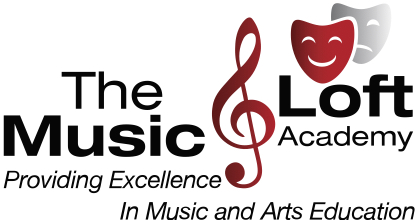FAQs
- Home
- FAQs

How TMLA online music lessons work for everyone
At The Music Loft Academy, we know starting music lessons is an exciting journey, but we also know it comes with lots of questions. Whether you’re a child dreaming of playing your favorite songs, a parent seeking flexible options, or an adult ready to explore your musical potential, these are some of the most common questions that come to us about our unique programs and instruments.
- Technical Requirements
- Instrument Specific
- Practice and Performance
Need to know more?
If you have other questions that we haven’t addressed, please contact us and someone will be in touch to help.
Specific Instrument FAQs
General Questions
MusicFirst is a platform that is used all over the US by public and private schools. This proprietary learning platform offers student access to premier software applications for ear training, music theory, sight reading, composition, recording, a sizable content library, calendar (to keep track of assignments), and a subscription to In Tune monthly online magazine. The curriculum corresponds with individual state by state standards such as the National Core Arts Standards and Virginia Music Standards of Learning.
MusicFirst is a proprietary learning platform that many public and private schools across the US use. It gives students access to excellent software for:
* Ear training
* Music theory
* Sight reading
* Composition
* Recording
It also features a large content library, a calendar to track assignments, and a subscription to In Tune, its monthly online magazine. The curriculum aligns with standards such as the National Core Arts Standards and Virginia Music Standards of Learning.
It would be ideal if you had your instrument for your introductory lesson. We understand that selecting the right brand, size, etc, can be overwhelming so we are happy to help!
The best place to rent or purchase an instrument (we recommend renting before purchasing) is at a local music shop or luthier (for stringed instruments). We advise against purchasing cheap instruments at big box stores or on the internet. The internet can make an instrument look great, but the quality can be poor and not fixable or playable. If you do, you are setting your child up for failure. These instruments are made with low-quality materials that make it impossible to produce a good sound, cannot be repaired, and are generally unplayable. If you are not sure about the quality of an instrument you are considering….ASK a professional. We cannot stress enough that there is no such thing as a good cheap instrument.
The ideal starting age depends on the instrument and the child’s development. For example:
• Woodwinds (flute, clarinet, saxophone): Age 9 or fourth grade, when lung capacity and finger dexterity are better developed.
• Percussion: Ages 9-10, with the ability to focus for 30 minutes. Younger students may be evaluated on a case-by-case basis.
• Strings (violin, viola, cello, bass): Age 7 for smaller instruments like violin; middle school age for larger instruments like the double bass due to physical requirements.
• Guitar: Around age 9, though ukulele or Loog guitars are great alternatives for younger learners.
Technology Questions
To ensure a smooth online learning experience, you’ll need:
- A desktop computer or Laptop
- An Ethernet Cable that is connected to your router
- A Headset with a built in microphone
No, our platform allows for maximum connection with minimal equipment.
Piano Questions
Woodwinds Questions
Strings Questions
Voice Questions
Brass Questions
Guitar Questions
There are two basic guitars to choose from: A classical, nylon stringed guitar is for playing true classical music. It also utilizes mostly finger picking styles. The classical guitar has a very thick neck and all nylon strings which lends itself to classical and flamenco studies.
An acoustic guitar is the most popular of the two guitars as you can play anywhere and any style with it. The acoustic guitar has a combination of steel and nylon strings, and the neck is not as thick, allowing the flexibility to study and play a variety of musical genres. It should be sized to fit the student by a professional music teacher or reputable music store. *Most students choose this instrument.
Practice & Progress Questions
Performance & Opportunities Questions
Adult-Specific Questions
Absolutely! Many of our adult students are rediscovering their love for music after a break, and our instructors will help you build on your prior experience.
Other Common Questions
Private lessons allow for personalized instruction, correcting individual technique and posture issues, and addressing specific musical goals. This leads to faster progress and greater satisfaction.
Yes! If your interests change, we’ll help you transition to another instrument or program seamlessly.
We offer flexible scheduling, allowing lessons to be rescheduled with advance notice.


